Share
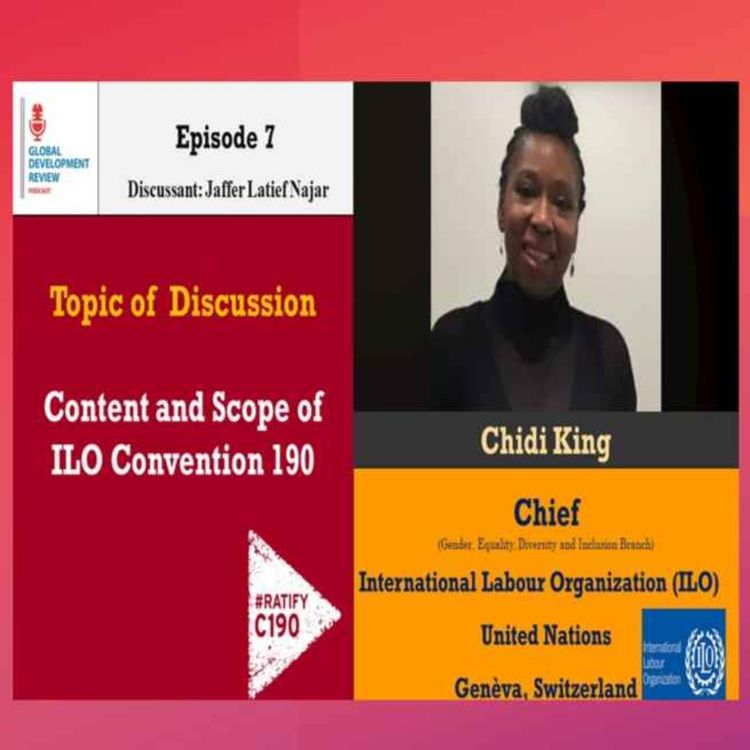
Global Development Review
Content and Scope of ILO Convention 190
According to International Labour Organisation (ILO), "ILO Convention No. 190 (C 190) is the first international treaty to recognize the right of everyone to a world of work free from violence and harassment, including gender-based violence and harassment. The Convention was adopted in June 2019, by the International Labour Conference of the International Labour Organization (ILO), and came into force on 25 June 2021. The Convention represents an historic opportunity to shape a future of work based on dignity and respect for all".
In this episode of Global Development Review Podcast, Jaffer Latief Najar discusses with our special guest Ms. Chidi King (Chief of the ILO Gender, Equality, Diversity and Inclusion Branch) about the content and scope of C 190, what C 190 offers and how it is helpful to the workers across the labour sectors, around the globe.
Our Guest Ms. Chidi King is the Chief of the ILO Gender, Equality, Diversity and Inclusion Branch. Previously, Chidi has worked as the Director of the Equality Department at the International Trade Union Confederation (ITUC). She has also worked as the senior lawyer with the whistle-blowing charity Public Concern at Work (now known as Protect).
We are active on social media platforms like LinkedIn, Facebook, Twitter and Google Podcasts. Please follow for future episodes and updates!
More episodes
View all episodes
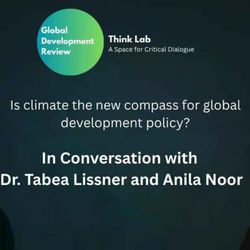
21. Is Climate the New Compass for Global Development Policy?
37:03||Ep. 21Welcome to Global Development Review, where we unpack the big questions shaping our shared future.In this episode, hosted by Dr. Jaffer Latief Najar, we ask a defining question for our era:👉 Is climate the new compass for global development policy?As the impacts of climate change deepen, from rising sea levels to forced displacement, food insecurity, and shifting economic priorities, the global development agenda is being redefined. No longer can progress be measured only in terms of economic growth or poverty reduction. Today, the challenge is how to build resilience, equity, and cooperation in a world shaped by environmental limits and social interdependence.To explore this transformation, we’re joined by two leading voices at the intersection of climate, development, and justice:🎙️ Guest 1: Dr. Tabea LissnerDirector for Climate Change, Robert Bosch Foundation (Germany)Dr. Lissner brings over 15 years of experience connecting science and policy to advance global climate action. As a Lead Author of the IPCC’s Sixth Assessment Report, her work bridges climate models with real-world adaptation needs of vulnerable communities.In this conversation, she reflects on:How the climate crisis is reshaping traditional development goalsWho benefits or risks being left behind in a climate-centered policy worldWhat forms of international cooperation and finance are needed for equitable transformation🎙️ Guest 2: Anila NoorFounder, New Women Connectors | Refugee Activist (Netherlands)Anila Noor shares insights from her advocacy for inclusion, migration, and gender justice. Her organization, New Women Connectors, amplifies the voices of refugee and migrant women, redefining inclusion as participation and leadership — not just integration.She discusses:How climate change drives migration and human mobilityWhy displaced communities must be recognized as agents of resilienceThe ongoing struggle for grassroots and refugee-led organizations to be treated as equal partners in shaping climate and gender justice agendas💡 Guiding Questions We ExploreHow is the climate crisis reframing the goals of global development?Can climate become a fair and inclusive compass for international cooperation?What happens when climate action risks reinforcing old inequalities?How can migration and inclusion be understood as part of climate resilience, not as a problem to be managed?Join Dr. Jaffer Latief Najar and his guests as they unpack how climate is not just an environmental issue, but a new guiding principle for justice, inclusion, and development in the 21st century.🎧 Listen. Reflect. Rethink global development.Subscribe to the Global Development Review for more conversations on the forces shaping our shared future.#ClimatePolicy #GlobalDevelopment #ClimateJustice #Migration #Inclusion #RefugeeVoices #ClimateChange #Resilience #SustainableDevelopment #GenderJustice #IPCC #ClimateAction #GlobalSouth #Equity #DevelopmentPolicy #climatejustice #COP #cop30 #COPBRAZIL
20. Are You Drinking Guilt-Free Coffee? Unpacking Exploitation\Environmental Hazards in Coffee Industry
35:27||Ep. 20☕ Is your morning coffee really guilt-free? In this episode of Global Development Review, we sit down with Etelle Higonnet, founder of Coffee Watch, attorney, and internationally recognized human rights & environmental activist. Knighted in France for her pioneering work to curb deforestation, Etelle has worked with organizations like Greenpeace, Amnesty International, and Human Rights Watch, and now leads efforts to end slavery and deforestation in the global coffee industry.👉 Tune in to this latest episode of Global Development Review Podcast to learn how your daily brew connects to global justice — and what you can do about it.⏱️ Chapters00:02:42 – The Coffee's Journey: From Farm to Cup00:07:00 – Do Fairtrade & Organic Labels Actually Work?00:12:21 – Environmental Harm: Consumer Demand or Lack of Regulation?00:16:49 – Profit & Power: Who Captures the Value in Coffee?00:21:37 – Individual Choice vs. Structural Change00:25:52 – Introducing Coffee Watch: Research & Advocacy00:28:02 – A Landmark Legal Victory for Coffee Farmers00:29:56 – A Vision for a Sustainable Coffee Future#Coffee #ClimateJustice #Sustainability #Podcast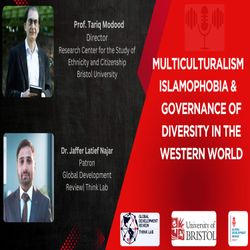
19. Multiculturalism, Islamophobia, and the Governance of Diversity in the Western World
49:44||Ep. 19The Global Development Review Podcast is pleased to feature Professor Tariq Modood, a distinguished scholar whose work has been instrumental in shaping contemporary debates on multiculturalism, race, and the governance of diversity.About our GuestProfessor Modood is a Professor of Sociology, Politics, and Public Policy at the University of Bristol, where he founded the Centre for the Study of Ethnicity and Citizenship. His research has profoundly influenced discussions on racial equality, religious identity, and the challenges democratic societies face in managing cultural diversity while maintaining social cohesion.His extensive body of work includes several influential publications, among them:Multicultural Politics: Racism, Ethnicity and Muslims in BritainMulticulturalism: A Civic IdeaThe New Governance of Religious Diversity (2024, co-authored with Thomas Sealy), which offers fresh insights into contemporary approaches to religious pluralism.Professor Modood was also the principal researcher for the landmark Fourth National Survey of Ethnic Minorities in Britain, a study that continues to inform both policy and academic discourse on race and integration. In recognition of his contributions to social science, he was appointed a Member of the Order of the British Empire (MBE) in 2001 and elected a Fellow of the British Academy in 2017.Key Themes of DiscussionThis episode engages with some of the most pressing questions concerning diversity governance in Western societies:Conceptualizing Islamophobia – What are its different manifestations, and how do Muslims in the West navigate its challenges in their daily lives?The trajectory of Islamophobia – Is it increasing or declining in Western societies, and how do political shifts, international conflicts, and patterns of cultural integration influence this trend?Moderate secularism as a framework for inclusion – Can this approach offer a viable pathway to reducing religious discrimination and fostering pluralism in liberal democracies?The future of multiculturalism – In an era of rising nationalism and populism, does the multicultural governance model remain viable? How can democratic societies continue to safeguard minority rights, particularly those of Muslim communities?Policy imperatives for diversity governance – What structural and institutional changes are necessary to balance multicultural inclusion with the principles of liberal democracy? Should governments adopt a more proactive role in addressing religious discrimination?The long-term prospects for governance of diversity – How will ongoing global conflicts, migration trends, and nationalist movements shape the future of inclusive multiculturalism in Western democracies?This discussion is particularly relevant to scholars, policymakers, and practitioners engaged in issues of race, religion, governance, and democratic pluralism. We hope that you learn from the insights shared by Prof. Tariq and enjoy this discussion.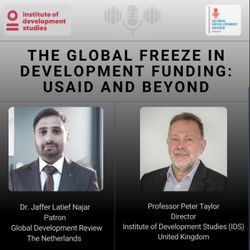
18. The Global Freeze in Development Funding: USAID and Beyond
40:17||Ep. 18Welcome to Global Development Review, the podcast where we explore the biggest challenges and opportunities shaping international development today. I’m your host, Jaffer Latief Najar, and today, we’re tackling an urgent and deeply concerning issue—The Global Freeze in Development Funding: USAID and Beyond.Over the past few years, we’ve seen a disturbing trend—major donors like USAID, the Netherlands, and the UK are scaling back their development aid commitments. This shift has sent shockwaves through the global development community, leaving NGOs, humanitarian organizations, and vulnerable populations in a precarious position. What’s driving these cuts? Which sectors—whether health, education, climate resilience, or conflict response—are being hit the hardest? And most importantly, what can be done to fill this funding gap before it’s too late?To break it all down, I’m honored to be joined by Professor Peter Taylor, one of the foremost experts in global development and an influential voice in research, policy, and strategy. Professor Peter Taylor is the Director at the Institute of Development Studies (IDS), where he previously served as Director of Research. With nearly 40 years of experience in international development, he has played a pivotal role in shaping research and policy at some of the world’s most respected institutions.From 2009 to 2019, he was Director of Strategic Development at the International Development Research Centre (IDRC) in Canada, where he led global initiatives to strengthen development research and knowledge-sharing networks. He has also held senior roles at IDS, including Research Fellow, Head of Graduate Studies, and Leader of the Participation, Power, and Social Change Team.Beyond academia, Professor Taylor has been deeply engaged in development practice—working as an Education Technical Advisor for the Swiss NGO Helvetas in Vietnam, a Lecturer in Agricultural Education at the University of Reading, and Head of the Agriculture Department at a rural secondary school in Botswana.In today’s episode, we’ll explore the root causes of the funding freeze, its far-reaching consequences, and the alternative solutions that could help sustain global In this podcast, we explore the following key questions: 1. The USAID funding freeze has been making headlines since the start of Trump’s second term, and now, similar development aid cuts in the Netherlands and the United Kingdom are amplifying concerns. This shift is sending shockwaves through the development sector, sparking widespread discussions. What are the key drivers behind the current freeze and decline in development funding from USAID and other major donors?2. How is this funding crisis affecting NGOs, humanitarian organizations, and developing countries that rely on these resources? Are there specific sectors—such as health, education, war affected areas, conflict zones, gender justice, or climate resilience—that are feeling the impact more than others?3. What types of development funding are most urgently needed today, and how does this compare to what is actually available?4. What alternative funding mechanisms could help fill the void? What steps should donor governments, multilateral institutions, and NGOs take to mitigate the effects of the funding freeze and ensure sustainable support for global development?5. How do you see the future of the development sector? Some experts warn that the recent wave of development aid cuts signals a shift toward the sector’s decline. Given these alarming trends, what are your insights on the future of global development?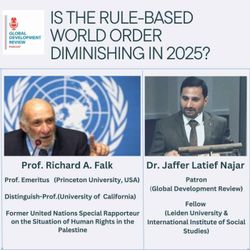
17. Is the Rule-Based World Order Diminishing in 2025? Professor Richard Falk in Conversation with Dr. Jaffer Latief Najar
49:38||Ep. 17Welcome to Global Development Review, the podcast where we explore critical issues shaping our world today. In this episode, Professor Richard Falk joins Dr. Jaffer Latief Najar to dive into a pressing question: Is the Rule-Based World Order Diminishing in 2025?To help us navigate this crucial discussion, we are honored to have Professor Richard Falk—one of the most influential figures in international law, global governance, and world order. He is the Albert G. Milbank Professor Emeritus of International Law and Practice at Princeton University, where he taught for over 40 years, and a former Visiting Distinguished Professor at the University of California, Santa Barbara.Throughout his prolific career, Professor Falk has authored more than 50 books and countless articles on global politics, international law, and human rights. His work has profoundly shaped debates on nuclear disarmament, world federalism, and global justice. As UN Special Rapporteur on Palestinian Human Rights, he played a key role in advocating for human rights and accountability on the global stage. Beyond academia, Professor Falk has been actively engaged in global activism, serving as Chair of the Board of the Nuclear Age Peace Foundation and contributing to major international commissions, including the Independent International Commission on Kosovo.Today, as we witness rising geopolitical tensions, challenges to multilateral institutions, and shifting global alliances, we ask: Is the rule-based world order eroding? If so, what comes next?In this episode, we explore:The global turmoil in 2025—including President Trump’s second term, the genocide in Gaza, the war in Ukraine, the Taliban’s rule in Afghanistan, repression and ongoing conflicts worldwide—and whether this signals the diminishing of the rules-based world order.Whether the global order is undergoing a transition, with emerging imperial powers challenging the dominance of the United States and Western regimes.The role and relevance of the United Nations in war prevention, international law, and diplomacy. Is the UN losing its influence,power and diplomacy, and what does UN future look like?How we can reimagine a more humane world order through social, political, and epistemic justice, as well as decolonial perspectives.What advice Professor Falk has for younger generations, especially those feeling hopeless amid colonial projects, genocides, repression, and shrinking spaces for resistance.Join us for this thought-provoking discussion with one of the foremost thinkers of our time, as we critically examine the shifting global landscape and the future of world governance.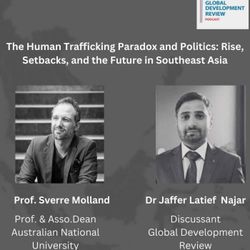
16. The Human Trafficking Paradox and Politics: Rise, Setbacks, and the Future in Southeast Asia
55:37||Ep. 16Welcome to Global Development Review! In today’s episode, we are joined by Associate Professor Sverre Molland,from Austrialian National University. Prof. Molland is an anthropologist specializing in the intersection of migration, aid, and security in mainland Southeast Asia. With over two decades of research and program experience related to human trafficking, development, and mobility in the Mekong region, he has conducted extensive research on migration and anti-trafficking interventions in a Southeast Asian context.His recent work focuses on "safe migration" governance in the Mekong region, along with a comparative analysis of anti-trafficking efforts, modern slavery initiatives, and safe migration aid modalities. He collaborates with UN agencies and external partners through consultancies and commissioned research to advance academic understanding in this field. Professor Molland has published widely on human trafficking and migration governance, including the monographs The Perfect Business? Anti-Trafficking and the Sex Trade Along the Mekong and Safe Migration and the Politics of Brokered Safety in Southeast Asia.In this episode, we will explore "The Human Trafficking Paradox and Politics: Rise, Setbacks, and the Future in Southeast Asia." Professor Molland will provide insights into the historical and contemporary landscape of anti-trafficking governance, its intersections with migration policies, and the evolving challenges in the region.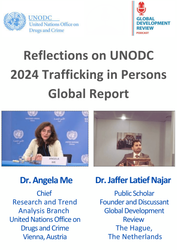
15. Reflections on UNODC 2024 Trafficking in Persons Global Report
40:42||Ep. 15In this episode,Global Development Review is delighted to welcome Dr. Angela as our expert guest. Dr. Angela is the Chief of the Research Branch at the United Nations Office on Drugs and Crime, where she oversees global, regional, and national research on drugs and crime. She is a co-producer and primary contributor to several flagship global reference publications of United Nations, including the World Drug Report, the Global Report on Trafficking in Persons, the Global Study on Homicide, and the World Wildlife Crime Report. With a strong background in data and statistics, Dr. Angela directs the generation, processing, use, and analysis of data at the United Nations Office on Drugs and Crime. She is a champion of data visualization and analysis to inform and influence policymaking. Over her extensive career at the United Nations, Dr. Angela has supported countries in enhancing their statistical and analytical systems. She has also authored, contributed to, and supervised the production of a wide range of United Nations analytical reports, international statistical standards, discussion papers, and intergovernmental documents spanning topics such as drugs, crime, population, gender, disability, and migration. An Italian national, Dr. Angela holds a Ph.D. in Statistics from the University of Padua in Italy. In this episode, Dr. Jaffer Latief Najar and Dr. Angela Me will critically dicuss and reflect on the 2024 Trafficking in Persons Report recently published by the United Nations Office on Drugs and Crime under Dr. Angela’s supervision. Dr. Angela will share the key findings of the report and discuss important aspects such as the methodologies employed, trafficking beyond the sex industry, regions at high risk, and gaps in current policies. We will also explore the shift from traditional anti-trafficking governance to modern slavery discourses, which emphasize broader systemic issues such as forced labor, and exploitation within global supply chains. This discussion will include the evolving roles of governance structures such as corporate compliance mechanisms, due diligence frameworks, and supply chain management systems. We will also delve into issues of agency and structural marginalization, the transition from traditional anti-trafficking governance to modern slavery discourses, and the evolving role of the United Nations Office on Drugs and Crime in this context. Global Development Review team hope you find this discussion engaging and informative.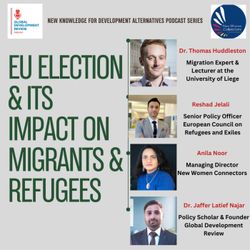
14. European Union Election and Its Impact on Migrants and Refugees
52:38||Ep. 14Welcome to the Global Development Review Podcast. This is the first episode of our new series, "New Knowledge for Development Alternatives." We are developing this new series in collaboration with New Women Connectors.New Women Connectors (NWC) is a social change movement that advocates for feminist ideals, and is led by migrant and refugee women who share common experiences and strengths. NWC work on transformative policy making in migration by breaking down the walls to exclusive policy spaces on all levels. NWC inform, convene and train policy makers and community leaders to create meaningful participation mechanisms that are inclusive, engaging and intersectional. NWC offers a global platform for bringing systematic change for a just society. Please check more details on NWC at https://www.newwomenconnectors.comThe aim of the 'New Knowledge for Development Alternatives' podcast series is to share knowledge and perspectives on issues related to women's rights, environmental concerns, and the rights and concerns of migrants and refugees.Today, in this episode, we will discuss the topic of European Union elections and their impact on refugees and the migrant community in Europe and around the world.In this episode, we have prominent experts who have been closely observing the outcomes of recent European Union elections and have been working on the issue of refugees and migration for many years.Our first guest is Dr. Thomas Huddleston. Dr. Thomas is an international expert on migration, integration, and citizenship. He currently lectures at the University of Liege while also advising refugee students and volunteers working on refugee resettlement. He is widely recognized for his original indicator and data collection as well as his work on innovation in policy and practice. His 60+ publications and hundreds of speaking engagements have helped improve migration policies across Europe and beyond.Our second guest is Reshad Jalali. Based in Belgium, Reshad works as a Senior Policy Officer at the European Council on Refugees and Exiles (ECRE). He is a member of the Expert Group on the Views of Migrants at the European Commission and serves on the advisory board of various civil society groups.Along with Thomas and Reshad, I am joined by Anila Noor. Anila Noor is the Managing Director of New Women Connectors. She advises the European Union, World Trade Organization, United Nations, and many other advocacy and civil society groups across the world.In this podcast, we discussed the following topics and questions:How do you interpret the outcome of recent election results in the EU? Which political parties gained significant ground in the recent EU elections, and what are their stances on migration and refugee policies?What are the main policy proposals from the newly elected representatives concerning migration and refugee issues?How do the recent election results influence the EU's approach to border management and Frontex's (European Border and Coast Guard Agency) role?What changes are expected in the funding and resources allocated to migration and refugee programs under the new EU leadership?How have recent election results affected or will affect the EU's cooperation with non-EU countries on migration and refugee issues?What are the expectations and demands of civil society and the refugee community, and what policy framework is required to bring about change?How can migrants participate in a meaningful way in political processes, and what challenges do they face in such elections? Why is it important to advocate for political participation?What is the way forward?We hope you enjoy our discussion. Please do follow us on Twitter and LinkedIn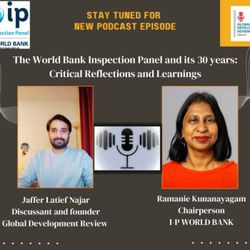
13. The World Bank Inspection Panel and its 30 years: Critical reflections and Learning
49:06||Ep. 13In this episode, our guest Ramanie Kunanayagam, Chairperson of The World Bank Inspection Panel, had discussion with Jaffer Latief Najar, sharing her insights on on the issues of accountability of the World Bank funded development projects, the role of Inspection Panel and its 30 years of learning, and critical reflections to the way forward.Ramanie Kunanayagam, a Sri Lankan-born Australian citizen, is current Chairperson of The World Bank Inspection Panel. She brings to the Panel three decades of experience across diverse geopolitical and multicultural environments in the private and public sectors. She has held leadership positions in sustainability in both the private sector (working for two FTSE 10 companies) and the nonprofit sector.Before joining the Panel, she was the Global Head for Social Performance and Human Rights for BG Group. She has been a member of the boards of two international non-profit development organizations—RESOLVE and the Institute of Human Rights and Business. Her appointment as a secondee to the World Bank very early in her career also gives her insight into and knowledge of the organization’s operations that complement the expertise she has developed working alongside civil society, multilaterals, bilaterals and communities affected by World Bank projects.In this episode, Jaffer Latief Najar asks the following questions to Ramanie Kunanayagam:1. What is the World Bank Inspection Panel. What is the purpose and goal of its establishment, and how and when it was established. Can you please share with us about the historical background of The World Bank Inspection Panel and the context behind its birth. 2. How the inspection panel engages with the cases of World Bank funded projects that seems to have damaging or negative impact on local communities and environment at the project sites. What is the procedure for selection of cases for inspection and accountability? 3. What is the methodology of Inspection Panel to check, inspect, examine, and enquire about the consequences of the World Bank Projects. Who are the people involved in the inspection process4. Are the reports and recommendations of Inspection panel taken seriously by World Bank or is it just a tokenistic response for the sake of accountability. Can you please share how the findings, recommendations, and advice of Inspection penal shape and influence the overall funding and accountability policy of world bank and its global development projects?5. I am wondering if it’s possible for you to please share one of the experiences of inspection panel about a case (in any country) where its recommendations have influenced the World Bank Policy6. One important role of the Inspection Panel is sharing lessons learned from past investigation cases in order to inform future operations of the World Bank. Can you tell us about your most recent publication on lessons learned which, as I understand, focuses on the protection of livelihoods among project-affected people?7. Scholars have concerned and underlined that climate change, gender injustices, displacement of local communities, loss of livelihood, forced migration, and dispossessions of Indigenous communities appeared to have been one of the negative outcomes of any development projects. Based on your experience as a chair, can you please share how Inspection Panel and World Bank policies deal with these concerns while funding a development project in any country. 8. This year, under your leadership as a chair, the Inspection Panel has completed 30 years of its existence and contributions. If I ask you about the critical reflections and learning of Inspection Panel from its past experiences and contributions, what would be those reflections and learnings.